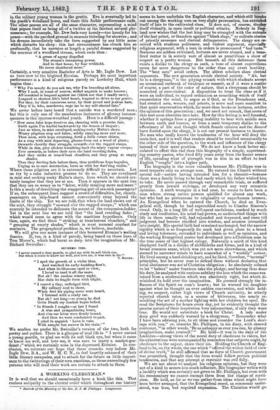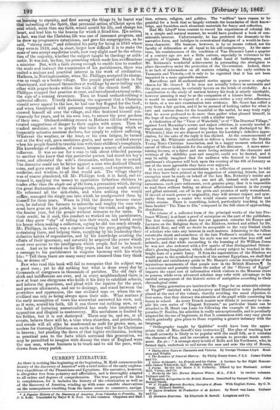A WORKING CLERGYMAN.* IT is well that we should occasionally
have a book like this. That curious antipathy to the clerical order which throughout our history
* Records of the Ministry of the Rev. E. T. M. Phalippa. Longmans.
seems to have underlain the English character, and which still breaks out among the working men on very slight provocation, has extended itself of late to the cultivated class. It does not, of course, display itself violently, in open insult or political attacks. Nobody in Eng- land now wishes that the last king may be strangled with the entrails of the last priest, or thunders against " black slugs," or collects stories of priestly revenues and clerical delinquencies. The clergy are re- ceived with studious politeness, and violent argument, especially religious argument, with a man in orders is pronounced " bad taste!' Sermons are seldom criticized, lectures are never abused, and a bene- ficed rector is in society sure of almost as punctilious a show of respect as a pretty woman. But beneath all this deference there exists a dislike to the clergy as such, a tone of almost supercilious scorn far more dangerous to the order than any overt hostility. The "best men" avoid orders. The ablest scholars shun clerical opponents. The new generation avoids clerical society. " Alt, but he is a clergyman," is the pitying remark with which students accept an occasional outbreak of virulence or conceit, as if it were a matter of course, a part of the order of nature, that a clergyman should be conceited or over-violent. A. disposition to treat the class as if it were an individual, to regard ordination as something which of itself emasculates the mind, to argue as if God, as the Frenchman said, had created men, women, and priests, is more and more manifest in that quiet conversation which, far more than books or lectures, settles the opinion of this generation ; and, we need not remark, that scorn of this sort soon ulcerates into hate. How far this feeling is well founded, whether it springs from a growing inability to bear with middle men between earth and heaven, or from a mere temporary dislike to the effeminacy of life and thought which female opinion and the Record have forced upon the clergy, it is not our present business to inquire. No man who really knows the tendencies of the hour will deny the main fact, and it is well that readers should be recalled occasionally to the other side of the question, to the work and influence of the clergy instead of their mere position. We do not know a book better cal- culated to effect this end than this biography of a simple, unpretend- ing country pastor, who lived fifty years away from the busier scenes of life, spending what of strength was in him in an effort to lead English "roughs" into a higher path. The biography is the more valuable because Mr. Phillipps was in most respects only an average man. He entered the Church without special call—nature having intended him for a chemist—because there was a family living to be had easily which his father wished him to take. He never passed through very remarkable trials, or suffered greatly from inward strivings, or developed any very eccentric opinions. A sixth wrangler in a bad year, he seems to have been a man whom strong native powers qualified for almost any work, but who had no pretensions to originality or superhuman acumen. An Evangelical when he entered the Church, he died an Evan- gelical still, though he had superadded much to Charles Simeon's creed. Only, in a long life of well-spent usefulness, marked by much study and meditation, his mind had grown, as undisturbed things with life in them usually will, had etianded and deepened, and risen till judgment had become clarified into wisdom, and acumen intensified into insight. His special faith had remained unchanged, but the narrow rigidity which is so frequently its mark had given place to a broad and loving tolerance, extended to individuals as well as opinions, and the working Evangelical pastor had developed into a Christian man in the true sense of that highest eulogy. Naturally a spirit of this kind displayed itself in a dislike of shibboleths and forms, and in a kind of broad common sense, which was yet not mere shrewdness, and which seemed to narrower minds to have somewhat of a "worldly" savour. He lived among a hard-drinking set, and he liked, therefore, "teetotal" principles, but he never rose to defend them without declaring that total abstinence was not of Christian obligation ; he absolutely refused to let "babies" under fourteen take the pledge; and having thus done his duty, he analyzed with curious subtlety the loss which the cause sus tamed from a moderation which was absolutely right, but which di- minished its hold over the imagination. He pressed strongly the in- fluence of the Spirit on men's hearts ; but he warned his daughter against what he thought an over sudden conversion, and while hold- ing, we suspect, rather high views of Church authority, he utterly rejected church rates, as a source of bitterness, too nearly re- sembling the act of a mother fighting with her children for spoil-. He read the Scriptures for hours every day, yet he evidently thought the precise nature of their inspiration very unimportant, if only they were true. He would not substitute a book for Christ. A lady under deep grief was suddenly warned by a clergyman, "Remember what. I have been advising you, to sit alone and consider the Lord's deal- ings with you," or, remarks Mr. Phillipps, in his diary, with shrewd contempt, "in other words, 'Be as unhappy as ever you can, by gloomy imaginations, make yourself.'" He held—it was in the days of the Luddites—strong views of the moral duty of obedience to rulers, but his exhortations were accompanied by reminders that subjects might, by obedience to the unjust, share their sin. Holding the Church of Eng- land to be, on the whole, the one which "offered the widest field of view of divine truth," he still affirmed that no form of Church government was proscribed, thought that the form would follow pertain political tendencies, and that any attempt at restraint. was evil folly. We are not about to analyze his religious opinions, but they were not of a kind to secure hint much influence. His biographer writes with a lucidity which was certainly not given to Mr. Phillipps, but even with his commentary we cannot exempt them from the- charge of mysti- cism. He held, so far as we can gather from ideas which might have been better arranged, that the Evangelical creed, as commonly under- stood, was true, -but required expansion. The Christian would go
Few who read this book will fail to recognize that its subject was a good man ; yet he did nothing but what is done every day by thousands of clergymen in thousands of parishes. The old days of sloth and indifference are over, and in every neighbourhood there is now at least one clergyman who holds it his duty to establish schools, and inform the guardians, and plead with the squires for the poor, and procure allotments, and see to drainage, and stand between the powerless and oppression, the one civilized man on whom the un- civilized can rely as being always upon their side. What matters if
the early assumption of vows has somewhat narrowed his view, and, as it were, seared his faith, till it can throw out nothing new, or it' the habit of lecturing uncontradicted has made him intolerant of opposition and illogical in controversy. His usefulness is limited by his foibles, but it IS not destroyed. There may be, and we, at all events, believe there will be, a time when churches, and priesthoods, and creeds will all alike be condemned as unfit for grown men, as useless for thorough Christians on earth as they will be for Christians
in heaven; but pending the dawn of that higher civilization, looking as practical men to the facts which surround this generation, we may be permitted to imagine with dismay the state of England were the one man, whose business is to teach and to aid the poor, with- drawn from every parish.
on,Setmin to eternity, and first among the things to be learnt was thaf indwelling of the Spirit, that perennial action of Christ upon the soul which, more than any faith, would mould his life, and change his heart, and lead him to the heaven for which it fitted him. Ills notion, in fact, was that the Christian life was one of incessant progress, and he drew up Progressive catechisms, and gave his congregation, as he said, "strong meat," and ridiculed his party for being in 1850 where they were in 1810, and, in short, forgot how difficult it is to make the mass of men accept aaydivine truth, how very slight must be the educa- tion of the majority, whether the subject taught be theology or arith- metic. It was not, we fear, his preaching which made him so efficacious a minister. But, with a faith strong enough to enable him to comfort































 Previous page
Previous page